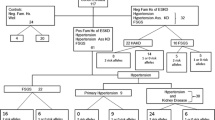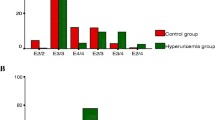Abstract
Objective: Apolipoprotein E (ApoE) genetic variation which is a major constituent of plasma lipoproteins causes diabetic nephropathy progress. Chronic kidney disease is associated with increased E2 allele and the decreased E4 allele risk. The aim of this study was to investigate the association between ApoE gene polymorphism in the development of diabetic nephropathy in Type 2 diabetes Turkish patients. Research design and methods: The objective of the study is to investigate the influence of ApoE gene polymorphism in the development of diabetic nephropathy in Turkish Type 2 diabetes. The ApoE genotypes were determined retrospectively in 46 patients with nephropathy and 56 without nephropathy and a control group of 35 healthy individuals. Genomic DNA was extracted from peripheral leukocytes of the subjects using the High Pure PCR Template Preparation Kit. For the detection of the presence of the three ApoE E alleles ε2, ε3, and ε4 (codon 112 and 158) were analyzed by the commercial LightCycler ApoE Mutation Detection Kit. Results: No differences in ApoE genotype or the allelic frequencies of ε2, ε3 or ε4 were found between the Type 2 diabetic patient group (with and without nephropathy) and a control group. Conclusions: We conclude that the ApoE gene polymorphism is not associated with the development of diabetic nephropathy in Turkish Type 2 diabetic patients. Lack of association between ApoE gene polymorphism and Type 2 diabetic nephropathy might be due to ethnic differences.
Similar content being viewed by others
References
Baum L, Ng MC, So WY, et al. Effect of hepatic lipase -514C->T polymorphism and its interactions with apolipoprotein C3-482C->T and apolipoprotein E exon 4 polymorphisms on the risk of nephropathy in Chinese type 2 diabetic patients. Diabetes Care 2005, 28: 1704–9.
Mahley RW, Innerarity TL, Rall SC Jr, Weisgraber KH. Plasma lipoproteins: apolipoprotein structure and function. J Lipid Res 1984, 25: 1277–94.
Utermann G. Apolipoprotein E polymorphism in health and disease. Am Heart J 1987, 113: 433–40.
Liberopoulos E, Siamopoulos K, Elisaf M. Apolipoprotein E and renal disease. Am J Kidney Dis 2004, 43: 223–33.
Vauhkonen I, Niskanen L, Ryynënen M, et al. Divergent association of apolipoprotein E polymorphism with vascular disease in patients with NIDDM and control subjects. Diabet Med 1997, 14: 748–56.
Reilly SL, Ferrell RE, Sing CF. The gender-specific apolipoprotein E genotype influence on the distribution of plasma lipids and apolipoproteins in the population of Rochester, MN. III. Correlations and covariances. Am J Hum Genet 1994, 55: 1001–18.
Xhignesse M, Lussier-Cacan S, Sing CF, Kessling AM, Davignon J. Influences of common variants of apolipoprotein E on measures of lipid metabolism in a sample selected for health. Arterioscler Thromb 1991, 11: 1100–10.
Bickeböller H, Campion D, Brice A, et al. Apolipoprotein E and Alzheimer disease: genotype-specific risks by age and sex. Am J Hum Genet 1997, 60: 439–46.
Bonnet F, Cooper ME. Potential influence of lipids in diabetic nephropathy: insights from experimental data and clinical studies. Diabetes Metab 2000, 26: 254–64.
Chowdhury TA, Dyer PH, Kumar S, Barnett AH, Bain SC. Genetic determinants of diabetic nephropathy. Clin Sci (Lond) 1999, 96: 221–30.
Kimura H, Suzuki Y, Gejyo F, et al. Apolipoprotein E4 reduces risk of diabetic nephropathy in patients with NIDDM. Am J Kidney Dis 1998, 31: 666–73.
Leiva E, Mujica V, Orrego R, Prieto M, Arredondo M. Apolipoprotein E polymorphism in type 2 diabetic patients of Talca, Chile. Diabetes Res Clin Pract 2005, 68: 244–9.
Onuma T, Laffel LM, Angelico MC, Krolewski AS. Apolipoprotein E genotypes and risk of diabetic nephropathy. J Am Soc Nephrol 1996, 7: 1075–8.
Werle E, Fiehn W, Hasslacher C. Apolipoprotein E polymorphism and renal function in German type 1 and type 2 diabetic patients. Diabetes Care 1998, 21: 994–8.
Hsieh MC, Lin SR, Yang YC, Chen HC, Lin JN, Shin SJ. Higherfrequency of apolipoprotein E2 allele in type 2 diabetic patients with nephropathy in Taiwan. J Nephrol 2002, 15: 368–73.
Ilhan N, Kahraman N, Seckin D, Ilhan N, Colak R. Apo E gene polymorphism on development of diabetic nephropathy. Cell Biochem Funct 2006, 25: 527–32.
Pettitt DJ, Saad MF, Bennett PH, et al. Familial predisposition to renal disease in two generations of Pima Indians with type 2 (non-insulin-dependent) diabetes mellitus. Diabetologia 1990, 33: 438–43.
Freedman BI, Tuttle AB, Spray BJ. Familial predisposition to nephropathy in African-Americans with non-insulin-dependent diabetes mellitus. Am J Kidney Dis 1995, 25: 710–3.
Eto M, Saito M, Okada M, et al. Apolipoprotein E genetic polymorphism, remnant lipoproteins, and nephropathy in type 2 diabetic patients. Am J Kidney Dis 2002, 40: 243–51.
Chowdhury TA, Dyer PH, Kumar S, et al. Association of apolipoprotein epsilon2 allele with diabetic nephropathy in Caucasian subjects with IDDM. Diabetes 1998, 47: 278–80.
Araki S, Moczulski DK, Hanna L, Scott LJ, Warram JH, Krolewski AS. APOE polymorphisms and the development of diabetic nephropathy in type 1 diabetes: results of case-control and familybased studies. Diabetes 2000, 49: 2190–5.
Author information
Authors and Affiliations
Corresponding author
Rights and permissions
About this article
Cite this article
Erdogan, M., Eroglu, Z., Biray, C. et al. The relationship of the apolipoprotein E gene polymorphism in Turkish Type 2 diabetic patients with and without nephropathy. J Endocrinol Invest 32, 219–222 (2009). https://doi.org/10.1007/BF03346455
Accepted:
Published:
Issue Date:
DOI: https://doi.org/10.1007/BF03346455




